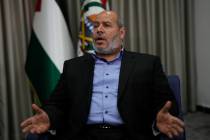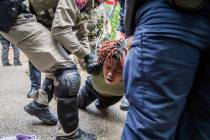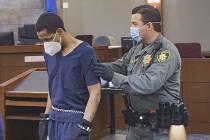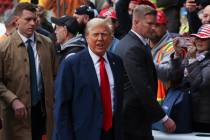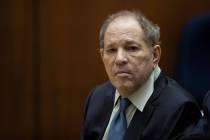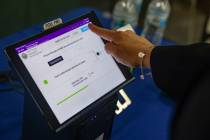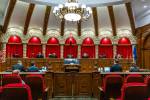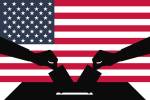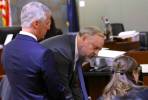Nevada Supreme Court rules Tax Commission violated open meeting law
CARSON CITY -- In a victory for proponents of open government, the Nevada Supreme Court ruled Thursday that the state Tax Commission violated the open meeting law when it deliberated and voted on a tax appeal in closed session.
The unanimous decision, which reversed a lower court ruling out of Carson City, came in connection with a refund of $40 million in use taxes sought by Southern California Edison.
The court decision voids the commission's 2005 vote to grant the utility the refund, which was sought for the operation of its now closed Mohave Generating Station near Laughlin.
"We conclude that the Tax Commission's practice of closing the entirety of a session at a taxpayer's request violates the open meeting law," said Justice James Hardesty, who wrote the opinion.
The commission had the right under Nevada law to close its meetings involving Edison, but only to receive confidential evidence and question those involved, he said. Hearing evidence that was not confidential, as well as its deliberations and vote, were required to be done in open session as the open meeting law requires, Hardesty said.
The opinion does allow the panel to meet in closed session to consider confidential information provided by a taxpayer as specified under a separate Nevada law.
The decision, while significant, is not expected to initiate a major change in how the Tax Commission conducts its business in the future, only because the Legislature last year already approved new rules for the panel to follow in its meeting process. The Supreme Court decision closely mirrors the new rules adopted by lawmakers.
Under the new law, the commission can go into a closed session to discuss a company's trade secrets and other propriety information, but then it must reopen the hearing, deliberate and vote in public.
The Tax Commission has already adopted regulations implementing the new rules.
Barry Smith, executive director of the Nevada Press Association, welcomed the ruling. The association filed a "friend of the court" brief in the case.
"The Supreme Court's ruling gets it exactly right for all the right reasons," he said. "It reinforces Nevada's open meetings law by reminding boards and commissions that the overriding principle here is openness. Any exception has to be very specific under the law.
"We recognized the Tax Commission's responsibility to protect confidential information, but it had gone too far by closing entire hearings," he said. "It was also voting in private, and there's never a good reason for a public body to hold a secret vote. This is a strong opinion from a Nevada Supreme Court that has shown it understands well the fundamental need for open government."
Others involved in the case either could not be reached or had no immediate comment on the decision.
The Tax Commission considered the utility's request for a refund on four separate occasions in 2004 and 2005, finally voting for the refund. The vote came in closed session despite advice from the attorney general's office that the vote be conducted in public.
"The Tax Commission declined to follow the deputy attorney general's advice and, following its long-standing practice, closed the hearing," Hardesty said in the opinion.
The attorney general then filed the open meeting law complaint in Carson City District Court. Because the commission was in a dispute with its own legal adviser, the attorney general's office, it hired private Reno attorney Thomas Wilson to represent it.
That representation has cost the state at least $500,000.
In its defense, the Tax Commission submitted nearly 30 years of hearing transcripts illustrating that, during that period, it deliberated and voted in closed sessions without objection from the deputy attorneys general in attendance.
The court opinion says during the closed sessions to consider the Edison matter, the commission deliberated whether to allow Clark County and the city of Henderson to intervene in the appeal. It also voted to allow the local governments to intervene and determined their roles in the case. The panel also deliberated the merits of the appeal and voted for the refund of taxes.
Hardesty said a review of the closed sessions revealed many of the points of discussion could not be construed as confidential under Nevada law.
"This decision is not only important for the integrity of Nevada's open meeting law," Attorney General Catherine Cortez Masto said in a statement. "It is also important for the citizens of Nevada, because it ensures that our government will remain open and transparent when making decisions involving millions of dollars paid by taxpayers."
Contact Review-Journal Capital Bureau reporter Sean Whaley at swhaley@review journal.com or 775- 687-3900.









